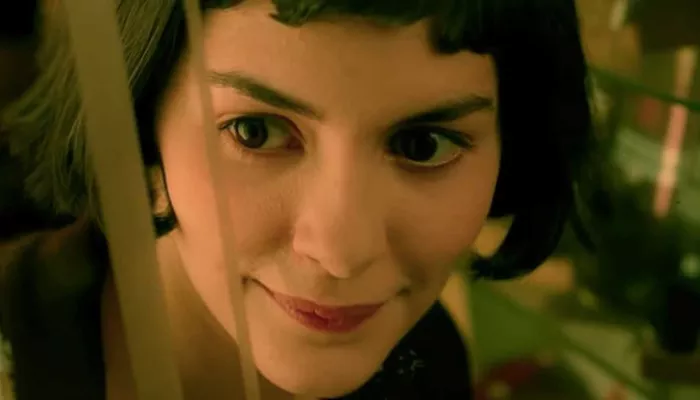In the hallway leading to my boyfriend’s apartment hangs a Japanese poster of the 2001 French romantic comedy Amélie. How it ended up there remains a mystery to both of us. No one in the building has claimed it, and amidst a sea of blue-green tiles between the first and second floors, it stands as the sole decoration. Every time I see that poster, I smile, reminded of the small, sometimes silly joys that give life meaning—and, more importantly, the magical power we have to treat each other kindly.
Amélie follows the shy yet mischievous Amélie Poulain (played by Audrey Tautou), a waitress living in Paris’s Montmartre district. Despite being one of the first “adult” movies I ever watched, it contains hardly any serious drama—save for a brief, intimate scene between lovers.
The film reveals Amélie’s lonely childhood shadowed by tragedy: her mother died after being pushed off Notre-Dame Cathedral by a suicidal Canadian tourist, and her father retreated into isolation, fixated on building a miniature shrine to hold her ashes. Though marked by solitude, the film’s bittersweet tone is vivid, filled with whimsical moments such as a fish’s suicide attempt and Amélie’s overactive imagination.
As she grows into a young woman embodying the whimsical spirit of early 2000s Parisian dreamers, Amélie sets out to bring happiness to those around her. She returns a childhood treasure to a lonely man, plays matchmaker between a waitress and a customer, and guides a blind man through the metro, painting the world with her words so he can “see” through her eyes—even if only briefly.
Amélie also sends photos of a garden gnome traveling the world to her father, encouraging him to do the same. No phrase captures the film’s essence better than the narrator’s reflection: “Amélie had a strange, absolute sense of harmony. It was a perfect moment—soft light, the scent in the air, the quiet murmur of the city. A wave of love and a desire to help humanity washed over her.”
From an ethical standpoint, it’s important to note that director Jean-Pierre Jeunet’s vision of Paris is not a realistic portrait. Rather than the Godard-esque city of gritty reality, this Paris is a colorful fantasy—part Emily in Paris, part Ratatouille—full of charm and whimsy. While the film has been criticized for glossing over issues like poverty and racism, such escapism holds value in an uplifting movie that invites viewers to momentarily leave behind harsh realities.
Amélie’s love interest, Nino (played by Mathieu Kassovitz), is a quirky employee at a sex shop who collects strangers’ discarded photos. I appreciate this character because he reminds me how deeply we can care for people we have yet to meet. Throughout my life in various cities, I have been moved by the kindness of strangers—union volunteers who lent me their time, bystanders who protected me when I was alone late at night. Amélie’s acts of kindness may seem fanciful, but they carry a radical spirit—a quiet rebellion against the indifference and selfishness that often dominate city life.
The film also celebrates simple pleasures: cracking caramel custard with a spoon, skipping stones across the Canal Saint-Martin. Over the years, I too have cultivated a taste for these small joys. Browsing old postcards in an antique shop or listening to pigeons cooing at dawn bring me profound happiness—and pride. This affection stems from a long-distance friendship rooted in sharing our favorite things and believing the other will love them too. Thanks to Amélie, I feel a profound sense that such small moments can build a rich, meaningful life.
Related Topics:
- 10 Movie Characters Whose Deaths Were Too Predictable
- Cannes Film Festival Reflects Global Chaos Through Cinema’s Lens
- 10 Movies That Were Unintentionally Surreal

